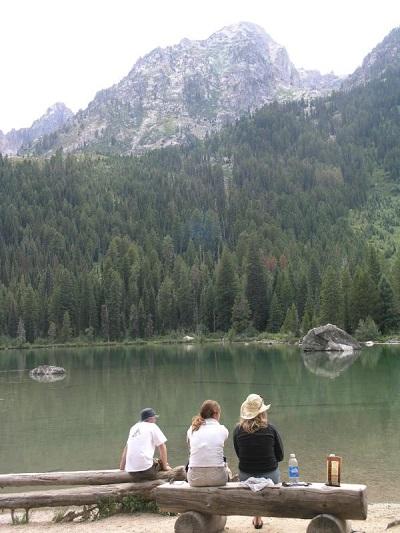
As String Lake has gained popularity at Grand Teton National Park, volunteers have been proactive about reducing conflicts with wildlife/NPS
Editor's note: The following is an unedited release from the National Park Service.
A new volunteer program to mitigate human-wildlife conflicts in the String Lake area has proven successful for Grand Teton National Park, and additional volunteers are wanted. The String Lake Volunteer Team offers interpretation and education services regarding safe recreational experiences in the lakeshore area. The volunteers promote the “Bear Aware” campaign reminding visitors about the responsibilities related to recreating in bear country, as well as help with the increased issues related to the popularity of the area. The program was based on the successful wildlife brigade volunteer program that the park created in 2007.
String Lake, located north of Jenny Lake, is easily accessible, hosts a scenic lakeshore and provides water recreation, hiking and picnic opportunities. The area has received an increase of visitation in recent years. The visitation growth resulted in numerous food storage violations in 2015, including the relocation of two black bears to a zoo. There has been an escalation in water recreation activities, parking demand and resource impacts.
The park initiated the volunteer program in June. There are approximately 14 volunteers that patrol the picnic area, parking lots, trails, and picnic sites. The team greets and orients visitors to the area, shares information about proper food storage practices, encourages ethical wildlife viewing and promotes recreational safety. Another value-added task is the monitoring and data gathering they conduct regarding parking behaviors, traffic patterns, resource impacts and signage.
Grand Teton National Park Superintendent David Vela said, “This group of volunteers is outstanding and we greatly value the positive impact they have contributed to the visitor experience and resource protection at String Lake.” To date, there have not been any significant human-wildlife interactions in the String Lake area this summer. He noted that additional volunteers are needed for the fall, and anyone interested in helping a minimum of five hours a week are encouraged to call the park at 307-739-3410.
The work of the volunteers is helping to determine some short-term actions that are being implemented that include identification of proper parking locations by painting and repainting curbs, and additional food-storage containers, informational signage, and temporary toilets facilities.
The park is planning a visitor-use study for the Leigh and String Lake areas that will begin next summer. This study will provide information about visitor access, use and experience, and resource impacts associated with increased visitation. Vela said, “This study will clearly define the existing conditions, and allow us to determine desired future conditions to meet our responsibility to protect the resources and provide a quality visitor experience.” It is anticipated the study will include two summers of data collection.



Add comment